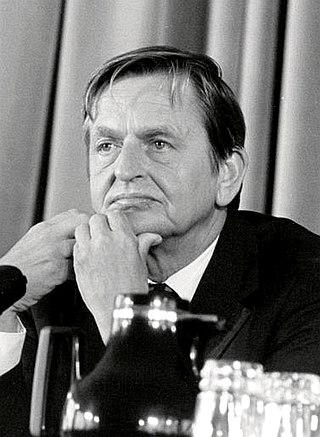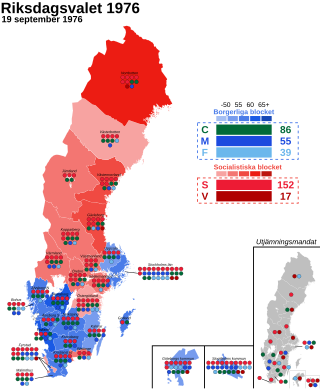| History of Sweden |
|---|
 |
| Timeline |
This article describes the history of Sweden from the late 1960s until 1991.
| History of Sweden |
|---|
 |
| Timeline |
This article describes the history of Sweden from the late 1960s until 1991.
During the mid-sixties, there was a strong wave of radical leftism in Sweden, sometimes precipitating heavily publicized events like the Båstad riots and the occupation of the student union building at Stockholm University - though never causing actual fatalities, in either street fighting or domestic political terror acts, as it did in Western Germany and Italy during these years.
"Solidarity" and "awareness" became watchwords, first in literary and student circles, then in the socialist/syndicalist underground, and finally, in the media and the government. By the early seventies, people and government, led by Prime Minister Olof Palme (s), rose in protest against oppression and war in countries as distant as South Africa and Vietnam (at the end of 1972, Palme famously indicted the American shock bombings of Hanoi and compared them to Nazi war crimes such as the destructions of Lidice and Oradour; the USA responded by calling home her ambassador). [1] The Swedish support for the ANC in and outside of South Africa and FNL and the Hanoi government in the Vietnam War were steady not only in words, popular support and help to enter the diplomatic arena, but also in economic (though not military) state subsidies. After Vietnam was reunited in 1975, for instance, Sweden supported the construction of a modern pulp plant at Bai Bang.
In 1973, journalists Jan Guillou and Peter Bratt exposed Informationsbyrån, a secret agency operating with some assistance of military personnel, but not a part of the military intelligence and not formally run by the military. One of its aims was to gather intelligence on communists and other people regarded as dangerous to national security. While the existence of such a thing, and in particular of its implied links to the Social Democratic party structure, was fiercely denied, the question continued to surface in a number of political scandals over the years, until it became the subject of serious historical discussion, a few state-issued retrospective white papers and political recant. Although some details are a bit hazy (including when and how it began) this "internal spying" outside of the ordinary state intelligence services, is now considered an established fact. IB in the form unraveled by Guillou and Bratt did not operate, it seems, beyond the mid-seventies.
The constitutional practice was changed several times during this decade. In 1971 the Riksdag became unicameral. By the new constitution of 1974 the monarch was divorced from all power of political intervention on their own, the end-point of an evolution that had been going on ever since the early years of the century. There have been no real attempts to abolish formal monarchy, though.
This article needs to be updated.(February 2011) |
The 1970s and '80s saw a rise in environmentalism – the ambiguous result of a referendum in 1980 advised government to phase out Swedish nuclear power by the year of 2010. The Chernobyl disaster in 1986 caused considerable radioactive fallout over Sweden. With only the Barsebäck nuclear power plant permanently closed, and ten out of twelve reactors still running (as of 2007), this schedule was no longer regarded as realistic, and in the 2006 elections the liberal (Folkpartiet) and the Moderate Party supported not only reversing the decision but building a few fresh nuclear plants. The Green Party was founded in 1981, entered the Riksdag in 1988 and supported Göran Persson's Social Democratic government from 1998 to 2006.
The 1976 parliamentary elections brought a liberal/right-wing coalition to power after almost half a century of social democrat leadership, and Mr Palme gave way to Thorbjörn Fälldin (of the Centre Party, a former farmers/landowners party which had incorporated social liberal ideas as well as the burgeoning environmental debate). Over the next six years, four governments ruled and fell, composed by all or some of the parties that had won in 1976, and the questions of energy and of battling the economic recession came to the fore. The fourth liberal government in these years, again with Fälldin at the helm, seemed somewhat baffled by these problems and had neither the support of a firm majority in the parliament, nor a clear mandate from the non-socialist part of the Swedish electorate. Predictably it came under fire both from the Social Democrats and trade unions, and from the Moderate Party, now heading in an increasingly Friedman-inspired and market liberal direction, and it was defeated in the elections of 1982, with Mr. Palme returning to the PM's seat.
During the 1980s there were several incidents of foreign, probably Soviet, submarines violating the Swedish territorial borders. In late 1981 the Soviet submarine U 137 ran ashore inside a restricted zone off the Karlskrona naval base, and became headline news. Though the particular fact was kept secret at the time, nuclear activity, probably from torpedo warheads was detected on board and reported to PM Fälldin while the vessel was still stuck in the firth. The incident marked a turning-point both in Soviet-Swedish relations and in the discussion in Sweden about defence, the Soviet Union and ultimately the place of Sweden in the arena of the Cold War .
On February 28, 1986, Prime Minister Palme was murdered as he was walking the streets of Stockholm with his wife. The crime came as a shock—indeed it is sometimes referred to as a national trauma, or an event by which Sweden "lost her innocence". The main suspect Christer Pettersson was convicted of the murder, but the conviction was reversed on appeal because the gun was never found. Pettersson died in 2004.
Palme was succeeded by his deputy Ingvar Carlsson.


The history of Sweden can be traced back to the melting of the Northern Polar Ice Caps. From as early as 12000 BC, humans have inhabited this area. Throughout the Stone Age, between 8000 BC and 6000 BC, early inhabitants used stone-crafting methods to make tools and weapons for hunting, gathering and fishing as means of survival. Written sources about Sweden before AD 1000 are rare and short, usually written by outsiders. It is usually accepted that Swedish recorded history, in contrast with pre-history, starts around the late 10th century, when sources are common enough that they can be contrasted with each other.

Sven Olof Joachim Palme was a Swedish politician and statesman who served as Prime Minister of Sweden from 1969 to 1976 and 1982 to 1986. Palme led the Swedish Social Democratic Party from 1969 until his assassination in 1986.

The politics of Sweden take place in a framework of a parliamentary representative democratic constitutional monarchy. Executive power is exercised by the government, led by the prime minister of Sweden. Legislative power is vested in both the government and parliament, elected within a multi-party system. The judiciary is independent, appointed by the government and employed until retirement. Sweden is formally a monarchy with a monarch holding symbolic power.

The Liberals, previously known as the Liberal People's Party until 22 November 2015, is a conservative liberal political party in Sweden. The Liberals ideologically have shown a broad variety of liberal tendencies. Currently they are seen as following classical liberalism and economic liberalism, and have been described as being centre-right. The party is a member of the Liberal International and Renew Europe.
The Green Party, commonly referred to as Miljöpartiet in Swedish, is a political party in Sweden based on green politics.

Jan Oskar Sverre Lucien Henri Guillou is a French-Swedish author and journalist. Guillou's fame in Sweden was established during his time as an investigative journalist, most notably in 1973 when he and co-reporter Peter Bratt exposed a secret and illegal intelligence organization in Sweden, Informationsbyrån (IB). He is still active within journalism as a column writer for the Swedish evening tabloid Aftonbladet. Among his books are a series of spy fiction novels about a spy named Carl Hamilton, and a trilogy(+) of historical fiction novels about a Knight Templar, Arn Magnusson. He is the owner of one of the largest publishing companies in Sweden, Piratförlaget, together with his wife, publisher Ann-Marie Skarp, and Liza Marklund.
Nils Olof Thorbjörn Fälldin was a Swedish politician. He was Prime Minister of Sweden in three non-consecutive cabinets from 1976 to 1982, and leader of the Swedish Centre Party from 1971 to 1985. On his first appointment in 1976, he was the first non-Social Democrat Prime Minister for 40 years and the first since the 1930s not to have worked as a professional politician since his teens. He was also the last Prime Minister to not be from the Social Democrats or Moderate Party.

Tage Fritjof Erlander was a Swedish politician and statesman who served as the prime minister of Sweden and leader of the Social Democratic Party from 1946 to 1969. Previously, he served as minister of education from 1945 to 1946, and was a member of the Riksdag from 1932 to 1973. During his premiership, Sweden developed into one of the world's most advanced welfare states, with the "Swedish Model" at the peak of its acclaim and notoriety. His uninterrupted tenure of 23 years as head of the government is the longest ever in Sweden and in any modern Western democracy.

Since the introduction of parliamentarism in Sweden, six national referendums have been held. Legal provisions for referendums were introduced in 1922, one year after the adoption of universal suffrage. The Constitution of Sweden provides for binding referendums, but all referendums held as of 2012 have been non-binding. The latest referendum, on adopting the euro, was held on 14 September 2003.

Gunnar Hedlund was a Swedish politician who served as chairman of the Centre Party from 1949 to 1971. He served as Minister of the Interior 1951 from 1957 and was a member of the Riksdag (parliament) from 1942 to 1976.

The IB affair was the exposure of illegal surveillance operations by the IB secret Swedish intelligence agency within the Swedish Armed Forces. The two main purposes of the agency were to handle liaison with foreign intelligence agencies and to gather information about communists and other individuals who were perceived to be a threat to the nation.

General elections were held in Sweden on 19 September 1976. Although the Swedish Social Democratic Party remained the largest party, winning 152 of the 349 seats in the Riksdag, a coalition government was formed with the Centre Party, the People's Party and the conservative Moderate Party, which formed Sweden's first non-socialist government since 1936. Centre Party leader Thorbjörn Fälldin, who had widely been expected to take over the government in the previous election of 1973, was appointed Prime Minister, the first not from the Swedish Social Democratic Party since Axel Pehrsson-Bramstorp's brief interregnum 40 years earlier.

General elections were held in Sweden on 16 September 1979. Although the Swedish Social Democratic Party remained the largest party, winning 154 of the 349 seats in the Riksdag, the liberal interim government of Ola Ullsten was succeeded by another centre-right coalition government composed of the People's Party, the Moderate Party and the Centre Party, led by Centre Party leader Thorbjörn Fälldin. The three parties together won 175 seats, compared to the 174 won by the Social Democrats and Communists. It was the only time that non-socialist parties retained power in an election between 1928 and 2010. The Moderates dramatically increased their representation in the Riksdag, becoming the largest party of the non-socialist bloc, a position they maintained until 2022.

The deputy prime minister of Sweden is the deputy head of government of Sweden. The incumbent deputy prime minister is Ebba Busch.

The relations between Sweden and the United States reach back to the days of the American Revolutionary War. The Kingdom of Sweden was the first country not formally engaged in the conflict to recognize the United States before the Treaty of Paris. The Treaty of Amity and Commerce was signed subsequently in 1783 between Benjamin Franklin and Swedish representative Gustaf Philip Creutz.
The first cabinet of Ingvar Carlsson was the cabinet of Sweden between 12 March 1986 and February 1990. The cabinet was formed as a direct consequence of the assassination of the incumbent prime minister Olof Palme on 28 February 1986. After which the Speaker of the Parliament, Ingemund Bengtsson, in accordance with the Constitution of Sweden discharged all ministers.
Olof Palme – En levande vilja: Tal och intervjuer is an audiobook on CD containing speeches and interviews with the former Swedish prime minister Olof Palme; ISBN 91-89080-95-5.
The cabinet of Ola Ullsten was the cabinet and Government of Sweden from 18 October 1978 to 12 October 1979.

The Left Party is a socialist political party in Sweden. On economic issues, the party opposes privatizations and advocates for increased public expenditures. In foreign policy, the party is Eurosceptic, being critical of the European Union and opposing Sweden’s entry into the eurozone. It attempted to get Sweden to join the Non-Aligned Movement in 1980, but did not succeed. The party is eco-socialist, and supports republicanism. It stands on the left wing of the political spectrum.

The Minister of Economics was a member of the government of Sweden. The minister of economics was the head of the Ministry of Economics from 1976 to 1982 which dealt with long-term guidelines for economic policy, the principle orientation of financial and credit policy, international economic cooperation, statistics, questions regarding banking and insurance, the stock exchange and the monetary system.